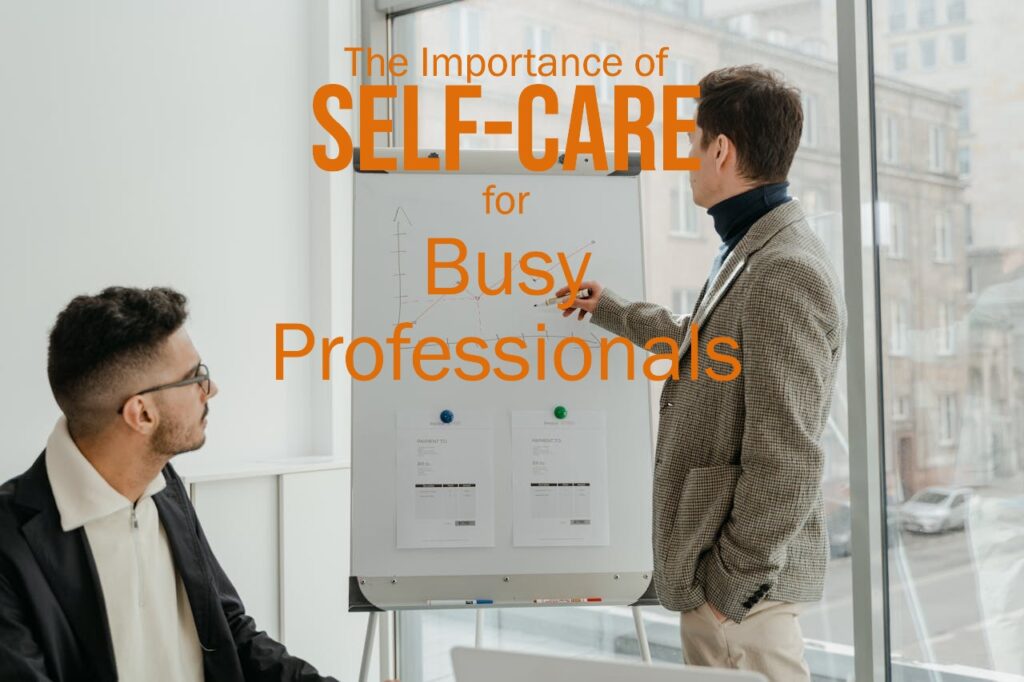
In today’s fast-paced world, busy professionals often put their work above everything else, neglecting their well-being in the process. Long hours, tight deadlines, and high expectations can lead to burnout, stress, and decreased productivity. However, prioritizing self-care is not a luxury it’s a necessity. This blog post explores the importance of self-care for busy professionals and provides practical strategies to incorporate it into daily life.
The Consequences of Neglecting Self-Care
Many professionals believe that working longer and harder leads to success. While dedication is essential, failing to care for yourself can have serious consequences:
- Burnout: Chronic stress and overworking can lead to emotional exhaustion and reduced performance.
- Declining Physical Health: Lack of exercise, poor nutrition, and inadequate sleep can lead to long-term health issues.
- Mental Health Struggles: Increased anxiety, depression, and cognitive fatigue can result from prolonged stress.
- Reduced Productivity: When energy levels drop, efficiency and focus suffer, leading to mistakes and lower-quality work.
- Strained Relationships: Overcommitting to work can damage personal and professional relationships.
The Benefits of Self-Care for Professionals
Prioritizing self-care can lead to numerous benefits that enhance both personal and professional success:
- Improved Focus and Productivity: Regular self-care helps maintain mental clarity and reduces stress.
- Better Physical Health: A well-balanced routine supports a strong immune system and overall wellness.
- Stronger Mental Resilience: Taking time for yourself helps combat anxiety and stress, leading to emotional stability.
- Enhanced Work Performance: A healthy mind and body contribute to better problem-solving and decision-making skills.
- Work-Life Balance: Setting boundaries and engaging in self-care fosters a fulfilling personal life alongside career ambitions.
Practical Self-Care Strategies for Busy Professionals
Despite hectic schedules, professionals can integrate self-care into their lives with simple yet effective strategies.
1. Prioritize Sleep (7 Techniques to Improve Sleep Quality Naturally)
Sleep is crucial for cognitive function, mood regulation, and physical health. Aim for 7-9 hours of quality sleep each night by:
- Creating a bedtime routine.
- Limiting screen time before bed.
- Maintaining a consistent sleep schedule.
2. Incorporate Physical Activity
Exercise boosts energy, reduces stress, and enhances focus. Ways to stay active include:
- Taking short walks during breaks.
- Using a standing desk.
- Scheduling regular workouts (yoga, strength training, or cardio).
3. Practice Mindfulness and Stress Management
Mindfulness techniques help professionals stay present and manage stress effectively. Try:
- Deep breathing exercises.(Breathing Exercises)
- Meditation for 5-10 minutes daily.
- Journaling thoughts and reflections.
4. Set Boundaries Between Work and Personal Life
To avoid burnout, establish clear work-life boundaries by:
- Defining work hours and sticking to them.
- Taking regular breaks to recharge.
- Learning to say no to unnecessary commitments.
5. Eat a Balanced Diet
Nutrition plays a significant role in energy levels and overall health. Focus on:
- Eating whole, nutrient-dense foods.
- Staying hydrated.
- Avoiding excessive caffeine and processed foods.
6. Foster Social Connections
Strong social support reduces stress and enhances well-being. Make time for:
- Networking and professional relationships.
- Quality time with family and friends.
- Engaging in hobbies and social activities.
7. Make Time for Relaxation and Enjoyment
Engaging in activities you enjoy helps relieve stress and improves mood. Consider:
- Reading, painting, or listening to music.
- Spending time outdoors.
- Practicing self-care rituals like spa days or massages.
Overcoming Common Barriers to Self-Care
Many professionals struggle to practice self-care due to time constraints, guilt, or workplace expectations. Here’s how to overcome these challenges:
- Time Management: Schedule self-care like any other important task.
- Eliminating Guilt: Recognize that self-care is essential, not selfish.
- Communicating Needs: Discuss self-care priorities with colleagues and managers.
- Starting Small: Begin with small changes and gradually build a routine.
Conclusion
Self-care is a crucial investment in both personal and professional success. Busy professionals who prioritize their well-being experience better productivity, improved mental and physical health, and a more fulfilling work-life balance. By implementing simple self-care strategies, professionals can enhance their performance and lead a healthier, more balanced life. Prioritize yourself today, and watch your career and well-being thrive.
